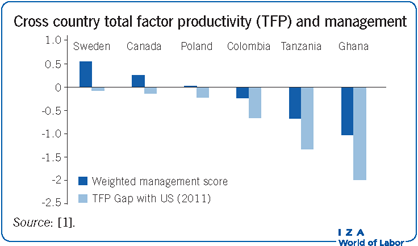Elevator pitch
Productivity differences across firms and countries are surprisingly large and persistent. Recent research reveals that the country-level distributions of productivity and quality of management are strikingly similar, suggesting that management practices may play a key role in the determination of worker and firm productivity. Understanding the causal impacts of these practices on productivity and the effectiveness of various management interventions is thus of primary policy interest.
Key findings
Pros
Adoption of management practices may improve quality and efficiency as well as encourage organization learning, thus leading to higher productivity.
Adoption of management practices enables firms to delegate more and achieve higher long-term expansion rates.
Managers who are more highly skilled are better able to deal with shocks to worker productivity and allocate human resources more efficiently.
Supervisory skills training may improve supervisor–worker relations and raise the well-being of workers.
Specific training programs may help correct the misallocation of managerial talent and reduce the gender gap in managerial leadership.
Cons
Most business training programs for micro and small firms have only modest effects on managerial quality and firm performance.
The take-up of training programs can be very low due to information barriers, distrust, time constraints, and attrition concerns.
Changing practices may result in adjustments in team dynamics and lower productivity in the short term.
Managers may not be able to implement the required changes due to misalignment of firm incentives and worker resistance.
